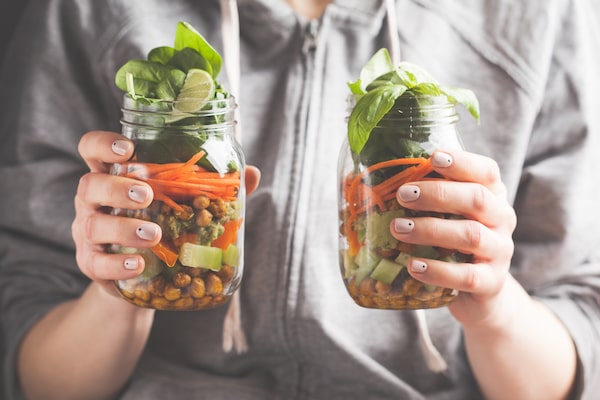
A woman holds and eats salad in a glass jar with baked chickpeas, guacamole and vegetables. Healthy diet detox vegan food concept.iStockPhoto / Getty Images
Q: My 13 year-old son is environmentally conscious and doesn’t eat red meat. Now, he wants to eat a vegan diet. Is that safe for a teenager?
As a dietitian in private practice, I’m often asked by parents for nutrition advice for their vegan teens. The concern: how to ensure their child gets the right nutrients, in the right amounts, to support a growing body.
A number of studies have concluded that children and teenagers can grow well and thrive on a vegetarian diet, provided that it’s well-planned and supplemented where necessary.
Even so, certain nutrients may be in short supply and require special attention, especially in the case of stricter vegan diets.
If your teen has expressed an interest in going vegan, or has already made the switch, the following dietary components deserve special consideration.
Calories: Vegan or not, growing kids need extra calories to support growth spurts and physical activity. High-fibre plant foods may make young vegetarians feel full with fewer calories.
Offer healthy snacks between meals to help your child get enough calories. Include nuts, seeds, nut butters, tahini, dried fruit and avocado, which are concentrated sources of plant-based calories.
Pay attention to your child’s food intake. In some cases, adopting a diet that eliminates entire food groups can be a sign of an eating disorder.
Protein: Protein needs of vegan children and teens may be slightly higher than meat-eating kids. That’s because plant proteins have different amino acid compositions than animal proteins. (Amino acids are the building blocks of protein.)
Still, protein requirements can easily be met on a vegan diet when kids get enough calories and eat a variety of plant foods.
Include a source of protein at all meals and snacks. Beans, lentils, peas, tofu, tempeh, edamame, nuts, seeds, soy milk and pea milk are especially good sources. Whole grains and vegetables supply some protein, too.
It’s not necessary to combine certain foods in a meal (for example, grains and beans) to get the nine essential amino acids that our body can’t make on its own. A variety of plant proteins eaten over the course of the day will supply enough.
Vitamin B12: Because plant foods don’t contain B12, vegans need to get this vitamin from fortified foods and/or a supplement.
Foods fortified with B12 include non-dairy milks, soy products, ready-to-eat breakfast cereals and nutritional yeast. Check ingredient lists to be sure. Choose a multivitamin with 5 to 10 micrograms of vitamin B12.
Calcium, vitamin D: Vital to increasing bone density, daily calcium requirements are high for teens and preteens (1300 mg for children ages 9 to 18). Adolescents with stronger bones may experience fewer fractures and have a lower risk of osteoporosis later in life.
Vegan sources of calcium include fortified non-dairy milks (300 mg per one cup), calcium-set tofu (check ingredient list for calcium sulfate), soybeans, pinto beans, navy beans, almonds, almond butter and tahini.
Kale, collard greens, bok choy and Chinese cabbage are also decent sources. While spinach, Swiss chard and beet greens are high in calcium, naturally occurring compounds called oxalates prevent much of the mineral from being absorbed.
Teens (and younger kids) also need 600 IU (international units) of vitamin D each day for bone health.
Iron: Vegetarians require 80 per cent more iron than non-vegetarians since the body doesn’t absorb the iron in plant foods (non-heme iron) as well as that in animal foods (heme iron).
Good sources of iron include lentils, chickpeas, soybeans, tofu, hemp seeds, pumpkin seeds, fortified breakfast cereals, spinach and dried prunes. Including a source of vitamin C (e.g., citrus fruit, strawberries, kiwifruit, red or green bell peppers, broccoli) in plant-based meals can increase iron absorption.
Teenage girls have higher iron requirements than boys owing to menstruation; a multivitamin and mineral supplement may be required to get enough.
Zinc: Needed for growth and development during adolescence, zinc is plentiful in lentils, pinto beans, black beans, chickpeas, pumpkin seeds, sunflower seeds, cashews, pecans and fortified breakfast cereals.
Leslie Beck, a Toronto-based private practice dietitian, is Director of Food and Nutrition at Medcan.
Sign up for the weekly Health & Wellness newsletter for the latest news and advice.